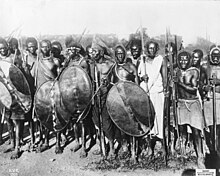Rugaruga

Rugaruga (also Ruga-Ruga ) was the name for different types of African armed forces in East Africa in the 19th and early 20th centuries.
The rugaruga of the Mirambo
The Rugaruga became known from 1860 as a troop of the Nyamwezi leader Mirambo in the west of today's Tanzania . As a trader in the caravan trade with slaves and ivory between the Congo and the East African coast, Mirambo had collected a capital that he put into the equipment of an army. To this end, he gathered a troop from Rugaruga, who are described as young men without social ties, often former slaves or runaway porters of trade caravans. Mirambo equipped them with muzzle loading rifles and conquered the royal dignity of the Nyamwezi people, which he held from 1860 until his death in 1884. The Rugaruga were his dreaded troop with whom he expanded his power.
Rugaruga as a regional warrior
The name Rugaruga became so popular that it was used in a broader sense as the name for the soldiers of a local ruler in East Africa.
Colonial militias
In the colonial era , it was also used to refer to irregular auxiliary troops , which village communities or chiefs made available to the colonial forces on a case-by-case basis. One of the first European expeditions in which Rugaruga took part was Paul Reichard's East Africa trip from 1880–1884. Unlike the Askaris , the Rugaruga were not part of the regular colonial armies such as the German Schutztruppe . Their armament generally consisted of older rifles, sometimes just spears and bows and arrows. They wore uniform parts or only colored ribbons and patches to identify them. Rugaruga were used under this name on both the British and the German side during World War I in East Africa .
Rugaruga as a rural police force
After the First World War , Rugaruga was then a name for rural police officers and law enforcement officers subordinate to the colonial “ chief ”.
Individual evidence
- ^ John Iliffe : A Modern History of Tanganyika . Cambridge University Press, Cambridge 1979, p. 64
- ↑ C. Velten: Swahili dictionary . Part I Swahili - German, Berlin 1910, keyword: Rugaruga
- ^ Conrad Weidmann: German Men in Africa - Lexicon of the most outstanding German Africa researchers, missionaries, etc. Bernhard Nöhring, Lübeck 1894, p. 145.
- ^ Karl Weule: Rugaruga , in: Heinrich Schnee (Ed.); German Colonial Lexicon . Volume III, Berlin: Quelle & Meyer, 1920, p. 192.
- ↑ Michael Pesek: The end of a colonial empire - East Africa in the First World War . Campus, Frankfurt a. M./New York 2010, pp. 187 ff., ISBN 978-3-593-39184-7 .
- ↑ Frederick Johnson (Ed.): A Standard Swahili - English Dictionary . Oxford University Press, 1939 (reprint 2000), keyword: Rugaruga